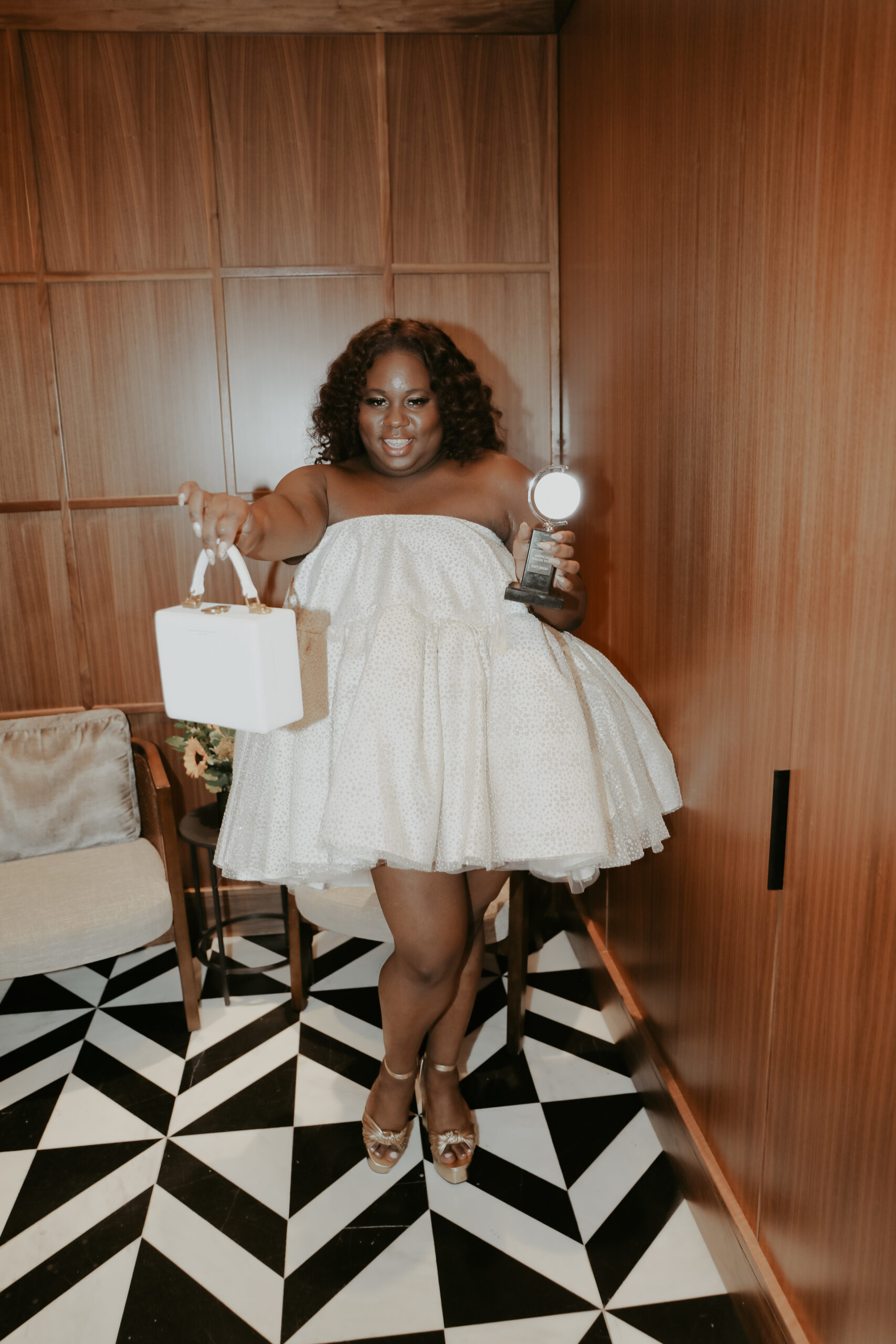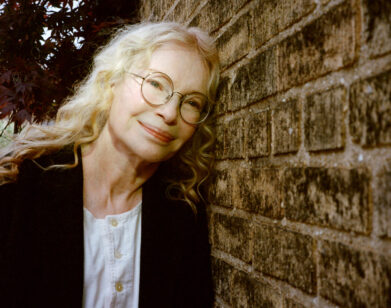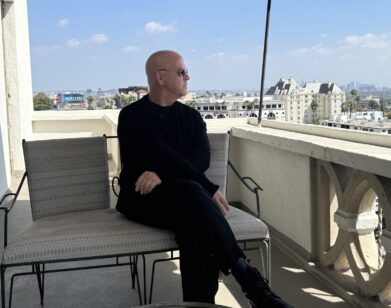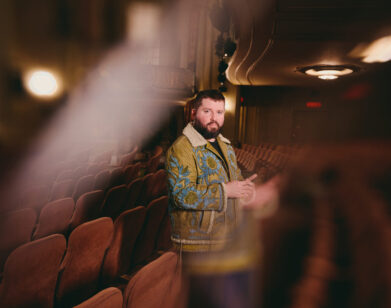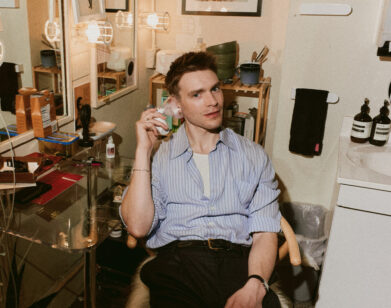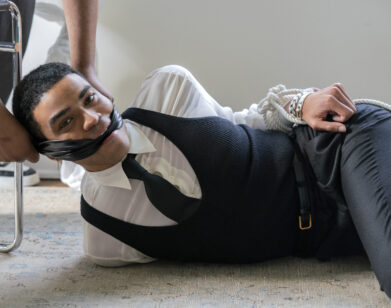WINNER
Alex Newell Doesn’t Mind Being Called a Diva
When Alex Newell moved to New York City seven years ago, they had nothing but a dream and beaucoup talent. After seducing Hollywood as Unique Adams in Ryan Murphy’s Glee, the Massachusetts native set their sights on the bright marquees of Broadway. In 2017, Newell’s performance as Asaka in the Tony Award-winning revival of Once On This Island positioned them as one of Broadway’s biggest voices and most sought-after actors. That all came full circle this past weekend when Newell won for best performance in a featured role at the 76th Tony Awards ceremony for their star turn as Lulu in “Shucked.” Along with J. Harrison Ghee (Some Like It Hot), Newell entered the history books as the first openly nonbinary performer to win a Tony. A few days before the ceremony, Newell got on the phone with their sis—the actor, writer, and producer Clark Moore—to reflect on the long and winding road to superstardom, working hard as a vengeance, and ministering audiences through song. – ERNESTO MACIAS
———
CLARK MOORE: Hello, sister.
ALEX NEWELL: Hi, sister.
MOORE: How are you feeling today?
NEWELL: Enough about me. Let’s talk about something else.
MOORE: Well, it’s funny because you’re coming right from Tony’s rehearsal. In the last few weeks alone, you’ve attended the Met Gala, and the very next morning you received your first Tony nomination. You have subsequently attended numerous theater award ceremonies. You won the Outer Critics Circle Award. You were personally invited to dinner at Anna Wintour’s house, which you actually had to leave early in order to fly to L.A. to shoot a spot on The Voice.
NEWELL: Yeah…
MOORE: All while doing eight shows a week. We say when it rains, it pours, but how are you soaking it all in?
NEWELL: Well, you don’t have time to soak it all in. If you want to talk about it in an honest way, there’s no time to sit and revel in it all. Because at the end of the day, I’m still having to get on stage eight times a week while doing everything else at the same time. And on top of all that, I’m moving.
MOORE: Well, it’s all the big life quadrants at the same time. It reminds me of what Michelle Obama said when they were in the White House, that you’d live 10 lives in one day. She said she wrote them down. Are you taking notes?
NEWELL: I haven’t written anything down. I don’t remember my name most days. No, I should probably start writing more things down.
MOORE: We need these details for the memoir.
NEWELL: It’s up there. Maybe I’ll just pen it right now.
MOORE: Speaking of memories, I remember the first day that I met you. We just celebrated our 10-year friend-iversary.
NEWELL: Golly. Why do you… It’s just numbers.
MOORE: Well, because we’re getting to that point where a decade, it’s significant. I remember it was a dance rehearsal for Glee with Zach Woodley, the choreographer. I just remember I saw the door open in the mirror, and you walked in and everyone kind of changed. The energy sort of got tense. I ran over to my phone and I was like, “Alex Newell just walked into rehearsal.” You stood there the whole time just staring us down.
NEWELL: Well, one, I was bored that day, and truly I was waiting to see J-Fo because Jennifer Foster and I auditioned for the Glee Project together. We’d known each other for years. I was like, “You’re finally here.” So I was just sitting and waiting for her, finding the impromptu times to actually hug her, because I hadn’t seen her.
MOORE: You were kind of our ambassador. You welcomed us into that crazy kooky family.
NEWELL: Welcome to the powerhouse, kids, chickens.
MOORE: You have gravitas, and that’s why I bring it up because you have this, people call it “star quality,” that thing where time and space kind of bend around you and people get really nervous or they get really excited or they cry. I’ve sort of watched this happen over the years and the way that you navigate these spaces. I’m curious, I don’t know that I’ve ever asked you this. Do you feel like that “X factor” is innate? Do you feel like it’s learned? Are you channeling someone?
NEWELL: No. I don’t think I’m channeling anyone. I think it’s a protection most days. I think that’s a lot for anyone that has that gravitational pull to them. With that, there’s a heightened awareness of everything in the room. At the end of the day, when I walk into the room, there’s going to be somebody that wants something from me at any given moment. I have to be hyper-aware of what I’m going to say and how I’m going to speak. So I think that anyone that has that gravitas is really focused on all of that.
MOORE: When did you realize that you needed that protection?
NEWELL: Well, growing up in Hollywood from when you’re 18—everywhere you go somebody wants something from you. I think that I was really cognizant of it probably in my fourth season of Glee, where I just knew that this is a thing.
MOORE: Yeah. That feels really scary.
NEWELL: Well, it is what it is. There’s no sugarcoating it. It’s part of my job. It’s part of my life now. On top of that, it’s like I am a once-in-a-lifetime kind of talent. I know my voice. I worked on my craft so much that I’m very sure in that. That’s another surety in my mind when I walk into a room.
MOORE: I see it happen all the time where people are just sort of in awe after you perform. But of course, entering a space as a queer person of color, there isn’t the same expectation from the other side. As your friend, it feels like you have to prove yourself every time you enter a room. Do you feel that?
NEWELL: Absolutely. Even in my own show now, it’s like I have to prove a lot of things. I’m always sure of what I need to do my job, but it’s proving to everybody else that these are the tools that I need to be able to give the performance that you want from me. It does get laborious, and it does get very tiresome. It does get triggering sometimes because it’s like, how many times do I have to tell you what I need so that I can do what you want me to do?
MOORE: I think that’s one of the things that’s so lovely about this moment, is that I was hoping that this would happen when you made your Broadway debut, and it didn’t happen that way, which is fine. But for it to be happening now, it feels so well-deserved. How long have you been in New York?
NEWELL: Seven years now?
MOORE: I always remind people that you moved there with nothing. You moved there with no job, and it was a long time of pounding the pavement before you started working. Now it’s been seven years before this big, huge role that’s turned it around for you.
NEWELL: Let’s be very frank and honest. I booked a job in Chicago immediately as soon as I landed. I did that for a couple months. Quite literally that same summer is when I got the final call back for Once on This Island. Later that summer I booked it.
MOORE: But that, to me, is pounding the pavement.
NEWELL: It is, essentially. I did come here with absolutely nothing. I was flying to New York at any whim given moment. It got to a point where I was just like, “I guess I should be here.”
MOORE: You felt the call.
NEWELL: I packed up. Well, my mother packed up my apartment, because I was filming something. I had a roommate for the first year that I was here. I kind of manifested. I had a goal. My goal was to be in a Broadway show when I moved to New York. And in that same year that I moved, I got my Broadway show.
MOORE: Right. You’re doing three or four full-time jobs all at the same time. I don’t know anyone who works as hard as you do.
NEWELL: Well, I’m a whore. And there’s no sugarcoating it. I have to keep every ball in the air at every given juncture. I’m a workaholic. I’m a work mule. I love to work, and I love complaining about all the work that I do. I’m always tired, and I love complaining about being tired. I think that’s the blessing of doing hard work. When you do hard work, you have the right to complain about it. You have the gumption and the wherewithal to complain and sit and bitch and moan about it because you are actually killing yourself.
MOORE: And underneath all of that complaining is this unimpeachable work ethic. Where did that come from?
NEWELL: It is truly a vengeance. I think I told you the story about my seventh or eighth-grade English teacher at that charter school that I went to where we were applying to schools, and she didn’t let me take the SSATs to get to apply to boarding schools. She said, “Honestly, your work ethic isn’t good enough to go to any of these schools.”
MOORE: Wow.
NEWELL: I’ve always had that in the back of my mind. Now my work ethic is better than anybody’s.
MOORE: You work so hard, but also you have found a way to carve a career for yourself in an industry that is not making any space for you. When I look at you and when I think of you, I think of abundance. Do you feel that way?
NEWELL: I don’t. [Laughs] I was saying something when I got the Outer Critics Award. I said, “For someone like me being plus size, queer, non-binary and black, I wasn’t supposed to be here. I was not supposed to stand in front of you all and accept any award. I wasn’t supposed to be in the position that I’m in right now, because I’m in an industry where the ‘different’ makes me so wildly uncastable that I had to prove myself and literally scream my way into my position that I have now.” None of us—me and J. Harrison Ghee, both of us weren’t supposed to be here.
MOORE: And yet, here you are. Shining, baby girl.
NEWELL: Lord, have mercy.
MOORE: I had the great fortune of attending the opening night as your guest.
NEWELL: Yes, darling.
MOORE: I flew all the way back from Paris. The energy in that theater, particularly that night, was electric. People were screaming and stomping their feet. How did that feel on stage?
NEWELL: It feels great, especially at the end of my number. I’m quite literally exhausted from screaming for three-and-a-half minutes. I’m working in overdrive. Anything that looks easy is the hardest. I’m worried about my breath. I’m worried about making sure that all the lyrics are there. I’m worried about not falling in the heels. “Is the wig wigging? Are the clothes clothing?”
MOORE: The corset?
NEWELL: “Can I breathe in general?” You get those 0.2 seconds at the very beginning and the very end of the applause that you can actually accept it. And it is beautiful.
MOORE: There is something divine about this whole experience. Everyone talks about your mid-show standing ovation, but you received mid-show standing ovations in Once on This Island as well. In fact, I’ve seen you perform over 100 times live, and I think you get standing ovations every single time. Part of what you’re talking about, it’s like when you catch the spirit.
NEWELL: Well, we all know my background is in the church. Everyone told me that I’d be a minister. I was always like, “No, I couldn’t do it. I don’t want to do it, so no.” And then one day this minister told me backstage, “Well, you are ministering.” And I was like, “What does that even mean? I’m not a minister. I’m not in somebody’s pulpit reciting scripture back to people and giving them teachings.” And he was like, “No, you minister through song, which is ministry, and what you’re doing is you’re giving people a sense of relief and a sense of safety and assurance while you sing.” I’ve been taking that more and more to heart now in my 30s. I’m letting everyone into what I deem my most intimate thing, which is my voice. It’s the one thing I nurture the most, it’s one thing I make sure is healthy. Some people, their body is their temple. No, these two little vocal folds are my temple. I nurture them. I make sure they’re hydrated. I make sure that they’re rested. I make sure that they’re warmed up, cooled down. This is my everything. Every time I open my mouth, I’m giving that gift to everyone that’s willing to receive it.
MOORE: We take that gift willingly. God hears you, and she is pleased.
NEWELL: Quite literally tickling her feet.
MOORE: I remember when you first started talking about this little play that was doing an out-of-town tryout in Utah, of all places. I remember helping you run lines for the audition in your living room uptown. I think it was the scene where your character and Maisie have this dizzying rapid-fire back and forth. I had to keep pausing because it was just so funny. And I remember you saying that that was a big part of why you chose to do this.
NEWELL: It is very funny. It was the only reason why I said yes to it. If you are a Broadway actor, you’re doing readings, you’re reading new works, you’re reading old works they’re trying to rework, you’re reading so many things and a lot of it is not great. When I read the script, I was like, “I understand this world.” Part of growing up in the South and having a mother and a whole entire family that’s part of southern culture, a farming background, and just understanding what it is to be a tight-knit community, I got that. I understood that. On top of that, it’s Robert Horn’s writing, which is brilliant. It’s very sitcom.
MOORE: Right. I think in our business, theater can be such a scary career proposition. It pays significantly less than TV and film. For someone like you who has as many opportunities coming along as you do, I imagine it could be daunting to walk away from big checks and take the risk.
NEWELL: I’m in a transitional state of my career where I know that a check will come. I put in the work to know that a check will come. It might not be tomorrow. It might be the next day. It might not be three months from now, but I know that a check is going to come. I’m very fortunate that I got two seasons of a successful television show during a pandemic. Where was I spending the money?
MOORE: I know that was the best thing for your bank account, that you couldn’t go anywhere.
NEWELL: My relationship with the monetized aspect of my career is shifting, which is a true blessing in itself.
MOORE: That’s beautiful. I also want to mention that the DJ played your song “Kill the Lights” at the opening night after party. You know what I’m thinking about? Do you want me to say it for Interview Magazine?
NEWELL: It’s fine.
MOORE: You were doing the music video for “Kill the Lights.” I think this was an example of where you knew what you wanted. Someone walked up to you and asked you, “Do you trust me?” And you looked them dead in their face and said, “No.” [Laughs]
NEWELL: Every director has their shot list and what they want and how they want it. They were setting up a camera shot of a hero shot—for most skinny people, it’s just the camera on the ground looking up at the performer or actor or model looking down at the camera. I said, “I’m fat. A hero shot is not the same thing when you’re fat, because all you’re going to get is all these chins. It’s not as flattering.” And then he asked. It’s hard to always vocalize that because as soon as you do, you’re labeled as difficult or rude or the diva. I’m perfectly fine with all those things because, at the end of the day, the product that I give out is spectacular.
MOORE: Last question. Of course, we have to mention your mother. I know she’s so proud of you, because she tells me all the time. Is she ready for the Tony’s?
NEWELL: She might be. I still have to figure out what she’s wearing, but I also have to figure out what I’m wearing first. She’s great. She’s wonderful. I taught her everything she knows. It’s funny, I’ve become more and more like my mother every day. And it’s always jarring to know that I’m becoming my mother. I think it’s also so new for her. I will say she’s done a lot of it, most of it, with a lot of grace.
MOORE: That’s right. You’re receiving these well-deserved honors. I feel like you are navigating this very tough, exhausting, ruthless schedule with grace and humility.
NEWELL: Thank you. I’m so glad that you see that.
MOORE: Best of luck, darling. I love you.
NEWELL: Love you, sister.

